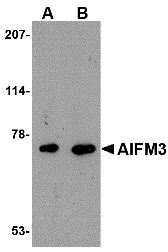Catalog# : 4541
Apoptosis, also known as programmed cell death, plays major roles in development and normal tissue turnover in addition to tumor formation. Recently a protein similar to the apoptosis-inducing factor (AIF) was cloned and designated AIFL (also known as AIFM3). AIFM3 is expressed ubiquitously and is predominantly localized to the inner membranes of mitochondria. Unlike AIF, AIFM3 does not translocate to the nucleus upon induction of apoptosis. However, overexpression of AIFM3, like AIF, induced cytochrome c release from the mitochondria, cleavage of caspase 3, and ultimately apoptosis, indicating AIFM3 induces apoptosis through caspase activation. Multiple isoforms of AIFM3 are known to exist.
Additional Names : AIFM3 (IN), Apoptosis-inducing factor mitochondrion-associated 3, AIFL
 Description
DescriptionLeft: Western blot analysis of AIFM3 in human brain tissue lysate with AIFM3 antibody at (A) 1 and (B) 2 µg/ml.
Source : AIFM3 antibody was raised against a 16 amino acid peptide from near the center of human AIFM3.
Purification : Affinity chromatography purified via peptide column
Clonality and Clone : This is a polyclonal antibody.
Host : AIFM3 antibody was raised in rabbit.
Tested Application(s) : E, WB
Buffer : Antibody is supplied in PBS containing 0.02% sodium azide.
Blocking Peptide : Cat.No. 4541P - AIFM3 Peptide
Long-Term Storage : AIFM3 antibody can be stored at 4ºC, stable for one year. As with all antibodies care should be taken to avoid repeated freeze thaw cycles. Antibodies should not be exposed to prolonged high temperatures.
Positive Control
- Cat. No. 1303 - Human Brain Tissue Lysate
GI Number : 74732608
Accession Number : Q96NN9
Short Description : (IN) Apoptosis-inducing factor mitochondrion-associated 3
References
- Jin Z and El Deiry WS. Overview of cell death signaling pathways. Cancer Biol. Ther. 2004; 4:139-63
- Xie Q, Lin T, Zhang Y, et al. Molecular cloning and characterization of a human AIF-like gene with the ability to induce apoptosis. J. Biol. Chem. 2005; 280:19673-81.

No comments:
Post a Comment